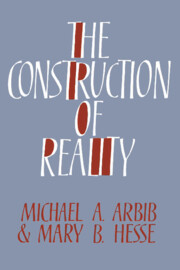Book contents
- Frontmatter
- Contents
- Preface
- Chapter 1 Posing the problem
- Chapter 2 The intelligence of the artificial
- Chapter 3 Schema theory
- Chapter 4 Relating mind and brain
- Chapter 5 Freedom
- Chapter 6 Freud on psychology and religion
- Chapter 7 Schemas: from the individual to the social
- Chapter 8 Language, metaphor, and a new epistemology
- Chapter 9 Interpretation and reality
- Chapter 10 Religions as social schemas
- Chapter 11 The Great Schema
- Chapter 12 Secular schemas
- References
- Author index
- Subject index
Preface
Published online by Cambridge University Press: 22 September 2009
- Frontmatter
- Contents
- Preface
- Chapter 1 Posing the problem
- Chapter 2 The intelligence of the artificial
- Chapter 3 Schema theory
- Chapter 4 Relating mind and brain
- Chapter 5 Freedom
- Chapter 6 Freud on psychology and religion
- Chapter 7 Schemas: from the individual to the social
- Chapter 8 Language, metaphor, and a new epistemology
- Chapter 9 Interpretation and reality
- Chapter 10 Religions as social schemas
- Chapter 11 The Great Schema
- Chapter 12 Secular schemas
- References
- Author index
- Subject index
Summary
The Construction of Reality develops an integrated perspective on human knowledge, extending ideas from cognitive science and philosophy of science to address fundamental questions concerning human action in the world and whether the space–time world exhausts all there is of reality. We seek to reconcile a theory of the individual's construction of reality through a network of schemas or mental representations with an account of the social construction of language, science, ideology, and religion. Along the way, we take account of much current research and debate in philosophy, linguistics, artificial intelligence, brain theory, cognitive science, evolutionary biology, social anthropology, history of religions, theology, and biblical and literary criticism. However, the reader will find no breathless pastiche here but a cumulative marshalling of evidence for a coherent and integrated view of the individual and social dimensions of human knowledge. We hope that it will stimulate the reader to find that within this integrated perspective there remains much scope for lively debate, particularly in our discussion of free will and of the reality of God.
For many people, even in today's secular world, God is the fundamental reality that gives meaning to human existence; for others, God does not exist, and whatever meaning human existence holds is to be found in society and in the more intimate groupings of family and friends.
- Type
- Chapter
- Information
- The Construction of Reality , pp. ix - xiiPublisher: Cambridge University PressPrint publication year: 1986

